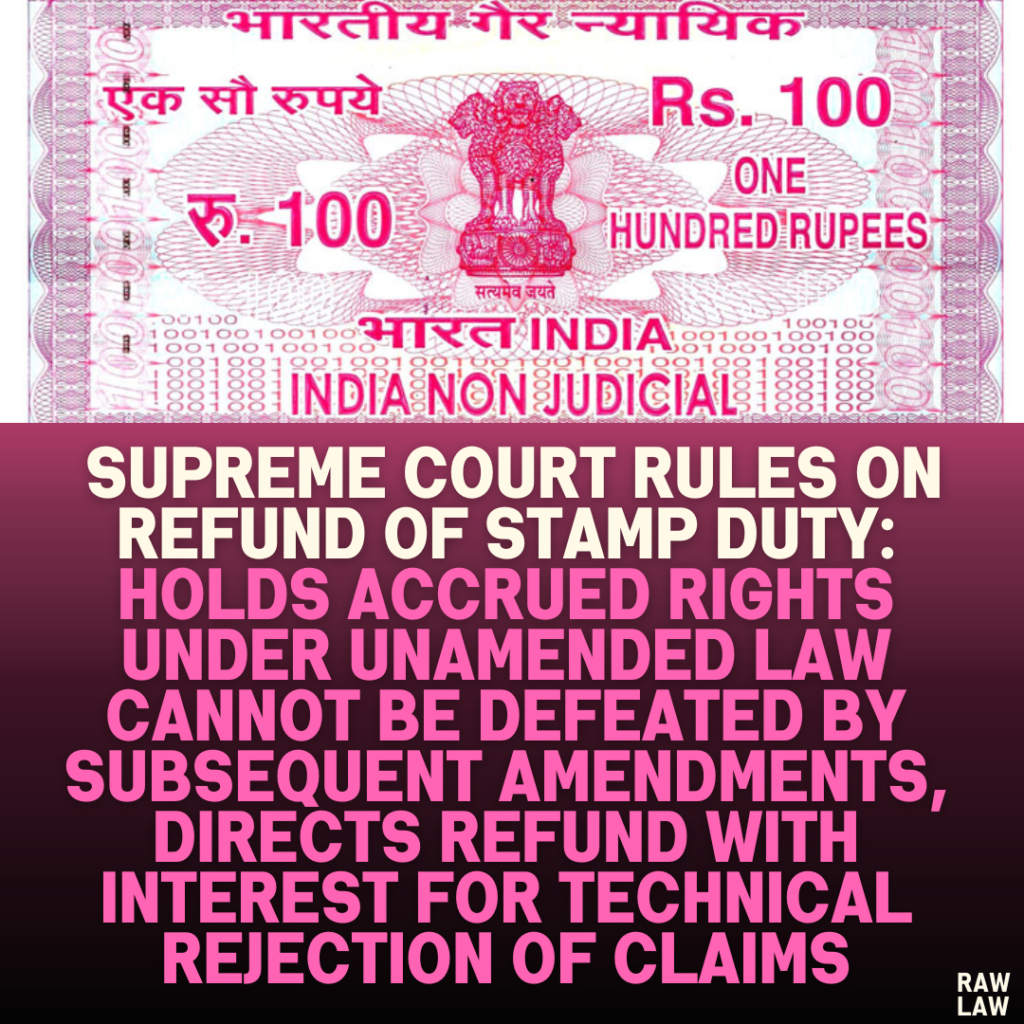Court’s Decision
The Supreme Court of India ruled in favor of the appellants, holding that their claim for the refund of stamp duty should be governed by the unamended provisions of Section 48(1) of the Maharashtra Stamp Act, 1958. The Court set aside the High Court’s decision, which upheld the rejection of the refund claim as time-barred. It quashed the subsequent orders of the Chief Controlling Revenue Authority (CCRA) recalling the original sanction for the refund, stating that the CCRA lacked the statutory power to review its own decision. The Court directed the respondents to process the refund of ₹27,34,500 with 6% simple interest from the date of the first order (08.01.2018) until payment, with an additional 12% interest for any further delay beyond the stipulated four weeks.
Facts
- The appellants entered into an agreement on 30.08.2014 to purchase a residential flat in Mumbai for ₹5.46 crores, paying ₹27,34,500 as stamp duty.
- Due to delays caused by issues involving adjacent slums, the developer failed to deliver possession by the agreed deadline of 31.03.2017. The developer offered three options: (i) transfer the booking to another project, (ii) cancel the booking and claim a refund with interest, or (iii) continue with an extended timeline for possession.
- The appellants chose to cancel the booking, executing a Cancellation Deed on 17.03.2015, which was registered on 28.04.2015.
- On 24.04.2015, the Maharashtra Stamp Act was amended, reducing the limitation period for refund applications from two years to six months from the date of registration of the cancellation deed.
- On 06.08.2016, the appellants filed for a refund, arguing that the unamended two-year limitation period applied since the Cancellation Deed was executed before the amendment.
- The Chief Controlling Revenue Authority (CCRA) initially allowed the refund on 08.01.2018, but later recalled its order on 03.03.2018, citing the amended six-month limitation period.
Issues
- Does the amended six-month limitation period under the Maharashtra Stamp Act apply to the appellants’ refund claim when the Cancellation Deed was executed before the amendment but registered after it?
- Does the CCRA have the statutory power to review its own decisions under the Maharashtra Stamp Act?
Petitioner’s Arguments
- The appellants argued that their right to seek a refund accrued on the date the Cancellation Deed was executed (17.03.2015), well before the amendment, and should be governed by the unamended two-year limitation period.
- They asserted that the CCRA had no statutory power to review or recall its original order dated 08.01.2018, which had allowed the refund.
Respondent’s Arguments
- The respondents contended that the amended six-month limitation period applied because the Cancellation Deed was registered after the amendment’s enforcement date.
- They argued that the appellants’ refund application was time-barred under the amended law.
Analysis of the Law
- Section 48(1) of the Maharashtra Stamp Act:
- Before the amendment, the Act provided a two-year limitation period for refund claims from the date of registration of the cancellation deed.
- After the amendment on 24.04.2015, the limitation period was reduced to six months.
- The Court examined whether this amendment could retrospectively apply to transactions executed before the amendment.
- Section 47 of the Registration Act, 1908:
- The Court emphasized that a registered document takes effect from the date of its execution, not from its registration. Thus, the appellants’ right to claim a refund accrued on 17.03.2015, under the unamended law.
- Judicial Precedents:
- In M.P. Steel Corporation v. Commissioner of Central Excise (2015), the Court held that amendments to limitation provisions cannot retrospectively extinguish accrued rights.
- The Court also referred to Bano Saiyed Parwaz v. Chief Controlling Revenue Authority (2024), which underscored that technicalities should not defeat a legitimate refund claim pursued in good faith.
Precedent Analysis
- M.P. Steel Corporation:
- The Court reaffirmed that amendments to limitation periods, while procedural, cannot retrospectively bar claims that were valid under the earlier law.
- Bano Saiyed Parwaz:
- The principle that limitation laws should not unduly deprive citizens of accrued rights was reiterated, especially when the claimant acted in good faith.
Court’s Reasoning
- The Court determined that the appellants’ right to claim a refund accrued on 17.03.2015, the date of execution of the Cancellation Deed, making the unamended two-year limitation period applicable.
- The CCRA’s recall of its original refund order violated principles of administrative law, as the CCRA lacked any statutory power to review its decisions.
- The Court criticized the High Court for focusing excessively on the registration date (28.04.2015) and for upholding the CCRA’s recall of the refund order despite acknowledging the absence of statutory review power.
- It emphasized that denying a refund on technical grounds undermines equity, especially when the appellants acted in good faith and were compelled to cancel the purchase due to delays.
Conclusion
The Supreme Court:
- Restored the original CCRA order dated 08.01.2018, which granted the refund.
- Quashed the subsequent orders recalling the refund, including the one dated 03.03.2018.
- Held that the appellants’ refund application was valid under the unamended law and directed the State to process the refund with 6% interest from 08.01.2018 until payment, with an additional 12% interest for further delays.
Implications
- This judgment reinforces that amendments to limitation provisions cannot retroactively defeat accrued rights.
- It limits the powers of quasi-judicial authorities, like the CCRA, to review or recall their decisions without express statutory provisions.
- It establishes that technicalities in limitation laws should not be used to deny legitimate claims, promoting fairness in fiscal and quasi-judicial matters.
4o




Pingback: Bombay High Court Rules Egyptian Law Governs Counter Bank Guarantee; Lifts Injunction Restraining SBI from Honoring Payment to Beneficiary, Emphasizes Irrevocability and Independence of Bank Guarantees - Raw Law